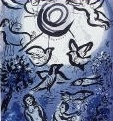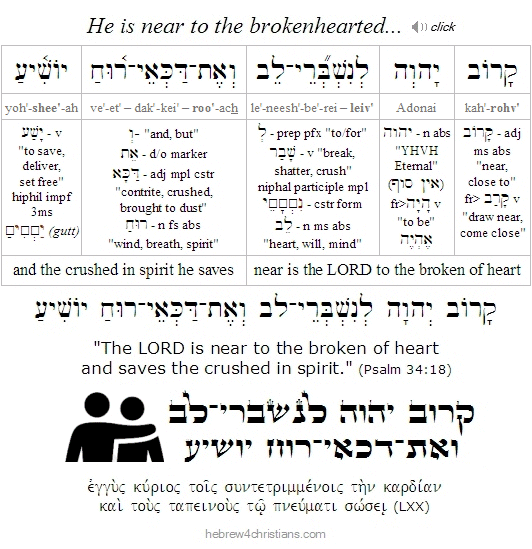|
BROKENNESS IS THE MEANS THROUGH which God performs some of His deepest work within our hearts. A.W. Tozer once said, "It is doubtful whether God can bless a man greatly until he has hurt him deeply." Likewise Alan Redpath once wrote, "When God wants to do an impossible task, He takes an impossible individual ŌĆō and crushes him."
This seems to be the divine pattern. "Truly, truly, I say to you, unless a grain of wheat falls into the earth and dies, it remains alone; but if it dies, it bears much fruit" (John 12:24). The hard "outer shell" of the seed must be broken so that the life of the Spirit can come through... Plainly put, God (and only God) can "deconstruct" the self so that life's priorities, focus, and passions are redirected to Him alone, the true Source of life.
The Lord is near to the nishbar lev, the one with a broken heart. The Hebrew word "lev" (ū£ūæ) metaphorically refers to our inner life, that is, our affections, mind, and will. This is revealed in the letters of the Hebrew word itself: the Lamed (ū£) depicts a "staff" used to direct something (i.e., the will), and the Bet (ūæų╝) depicts the "house" of the physical body. Lev then represents our inner life of thought and feeling expressed in our actions. Those who are broken in heart ŌĆō the nishberei lev ŌĆō have discovered that they cannot control their own lives, that they are inwardly "shattered," and therefore need divine help. Contrary to conventional wisdom, God helps those who cannot help themselves; He prefers to use broken vessels in His service (Psalm 51:19). As Tozer also wrote, "Beware of any Christian leader who does not walk with a limp."
There is parallelism in this verse. Both lev (ū£ųĄūæ) and ruach (ū©ūĢų╝ūŚųĘ) denote man's will and thoughts (Josh. 2:11; Deut. 2:30). Both the brokenhearted and the "crushed in spirit" ŌĆō dakkei ruach ŌĆō refer to those who need God's deliverance (i.e., ūÖų░ū®ūüūĢų╝ūóųĖūö, yeshuah). The word translated "saves" (yoshia) connotes the idea of "making room" from that which restricts or distresses us. Salvation is freedom from what oppresses and constricts our inward life. In that sense, Yeshua (ūÖųĄū®ūüūĢų╝ūóųĘ), whose very name denotes salvation, saves us from ourselves ŌĆō from the chaos of the carnal ego trying to run our own lives.
The LORD is "near" -- karov -- to the brokenhearted. This adverb means "close enough to touch." The same root is used for the word korban (ū¦ųĖū©ų░ūæų╝ųĖū¤), an offering that draws us near to God, as well as karov (ū¦ųĖū©ūĢų╣ūæ), a near kinsman. The Lord is near to the nishbar lev, the one with a broken heart.
The point of our brokenness is to draw us to God for healing: "The LORD heals the broken in heart and binds up their wounds" (Psalm 147:3). Yeshua came to "bind up the brokenhearted (nishberei lev), to proclaim liberty to the captives, and the opening of the prison to those who are bound" (Isa. 61:1). God is merciful and redemptive in His afflictions: "He shall not break even a bruised reed, nor snuff out even a smoldering wick. He shall bring forth the true way" (Isa. 42:3).
Yeshua is the healer of the broken heart and the Savior of those who are crushed in spirit. Blessed be His Name forever...
|


